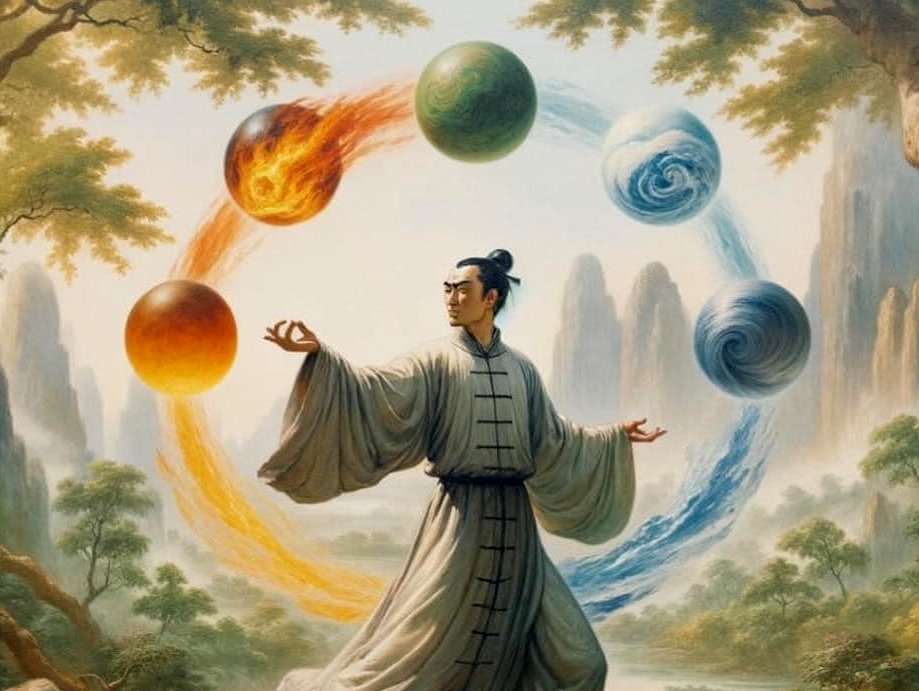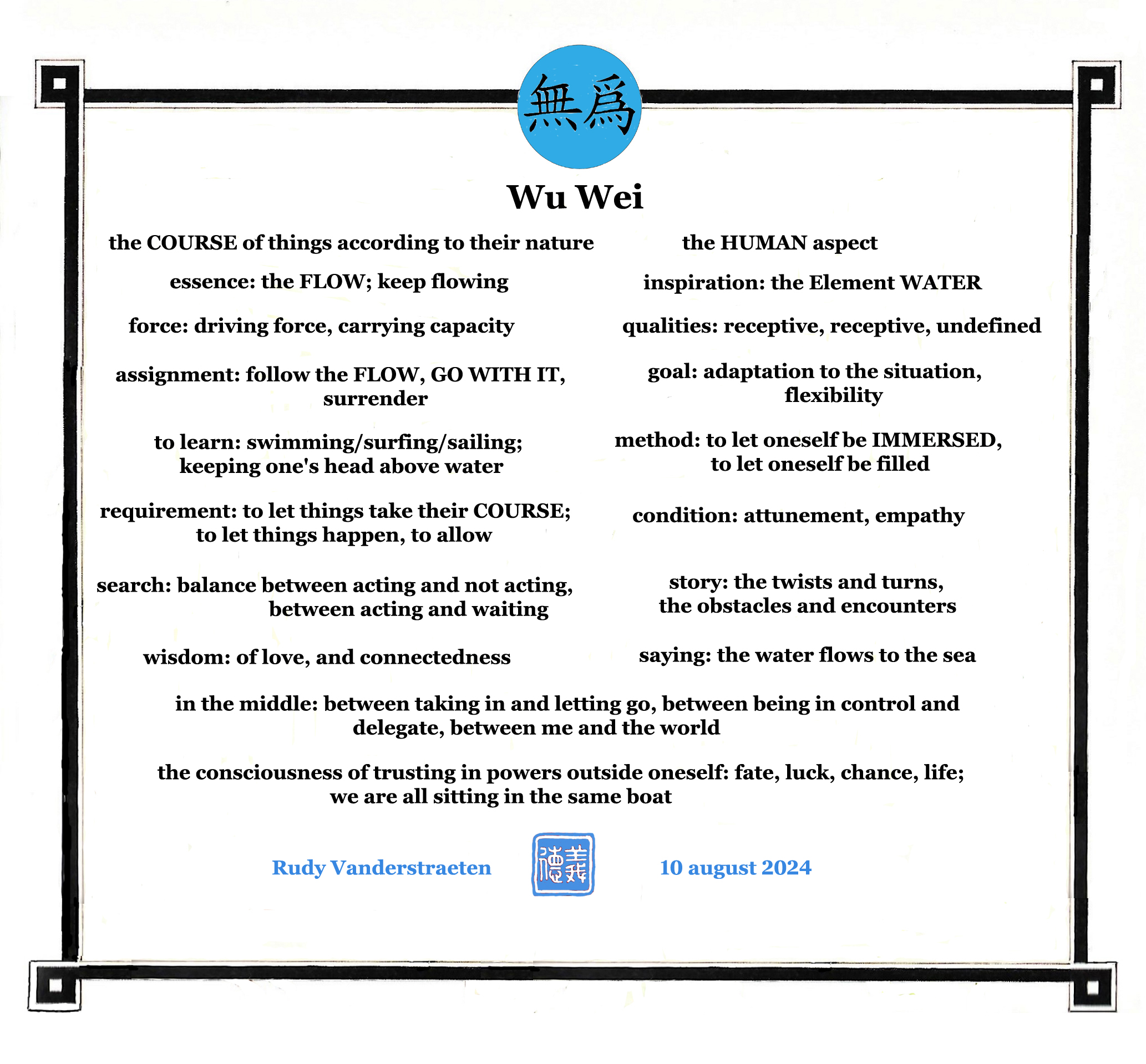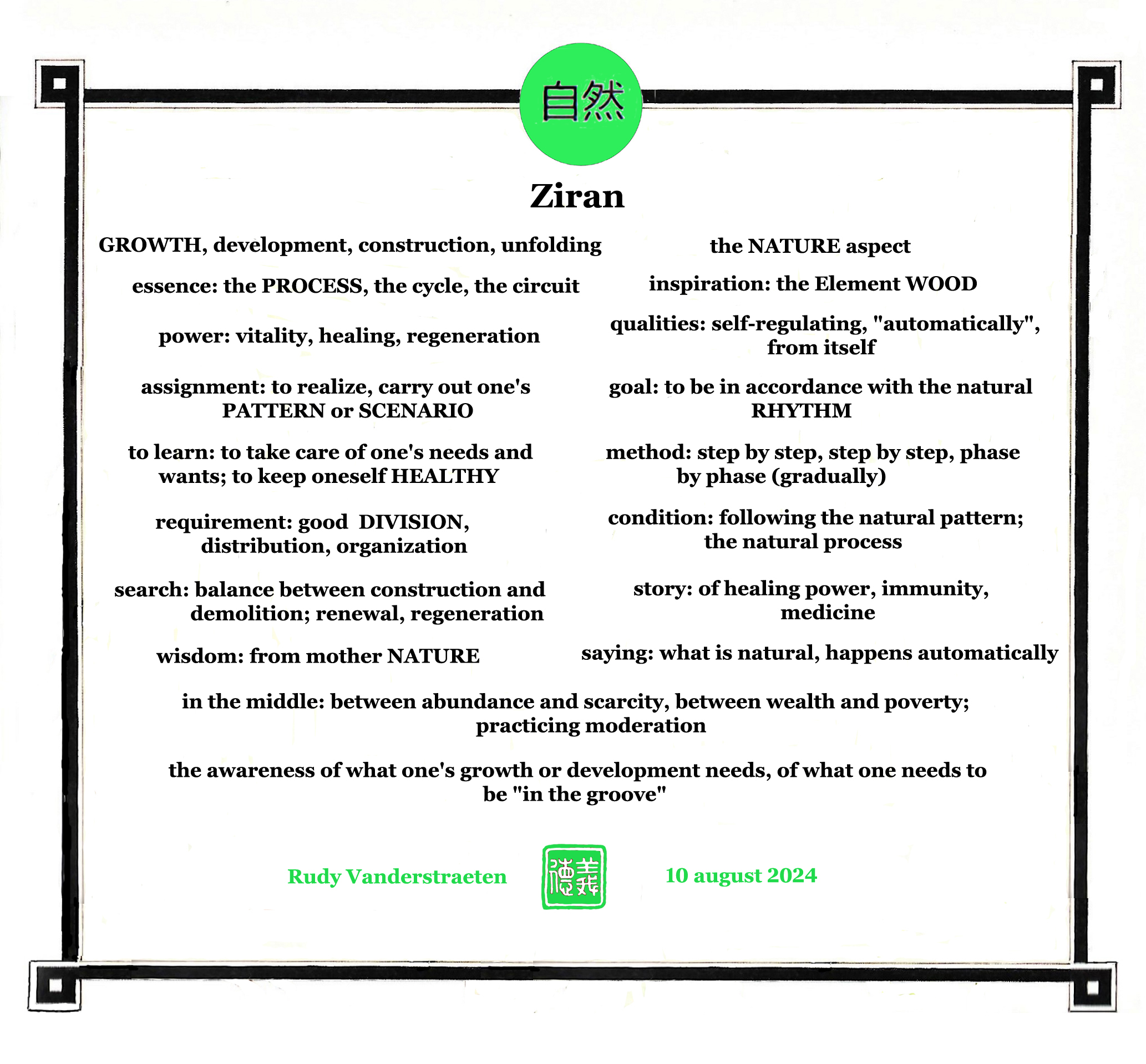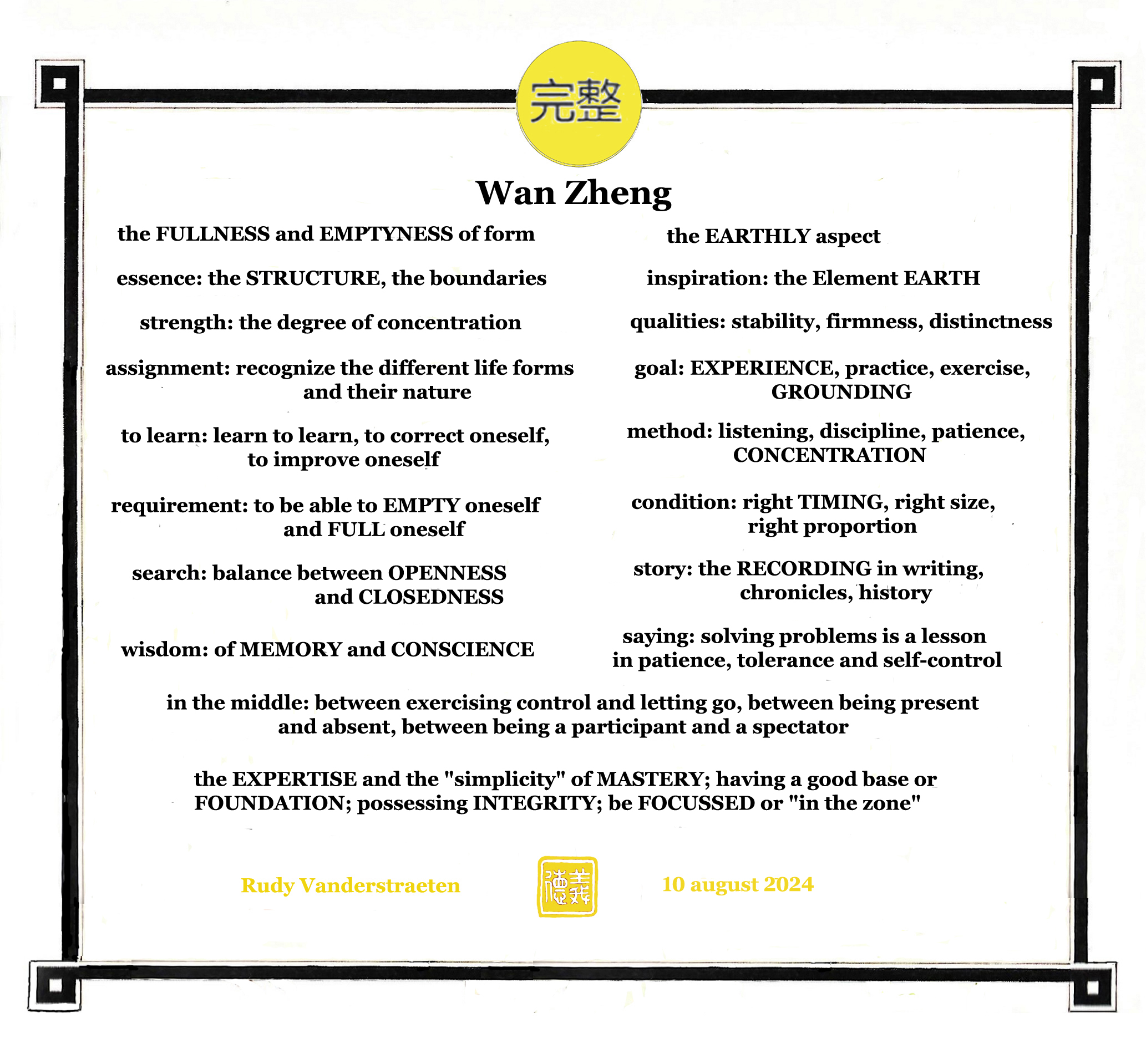Part 2
The modern Taoism 2.0 (Part 2)
Engish translation Published on 15 august 2024

Wu Wei (the Human aspect)
Wu wei is one of those Taoist concepts that is paradoxical in nature, and therefore should not be taken literally. Literally translated it means "not doing" in the sense of "not doing in order to do" ("doing not doing") or conversely "acting by not acting". The content is therefore that one should not act IN ORDER to achieve a certain goal that one had in mind, and that therefore goes against the course of events. After all, acting according to a preconceived plan always involves a certain forcefulness becau-se one wants to achieve or prove something with it, and in doing so often goes AGAINST the nature of things.
The easiest way to explain this is with a concrete example; for example, how one deals with one's garden. If one lets one's garden become completely overgrown, then one does nothing in or with one's garden: that is laziness and passivity, and not Wu Wei. Many people draw up a garden plan, or have one drawn up by a landscape ar-chitect, and then do a lot of work to execute that plan and keep it "the same": trim-ming hedges, pollarding trees, mowing the lawn, removing fallen leaves, combating "weeds" and "pests", .... In fact, one then tries to switch Nature off, or one regards it as an "enemy" that must be fought because it disrupts and attacks "the plan". How-ever, if one switches Nature ON, then one lets it do its self-regulating work that ensures a balance. One still has to do gardening work, but in accordance with the natural growth processes. His plan is then no longer the "holy grail" that must be kept intact, but the garden ages with the gardener. That plants and trees grow is the natural course of events that one should not resist or try to disrupt for self-interest. Hence the other possible description of Wu Wei as: non-disruptive action, or kno-wing WHEN to act, and when NOT to act. Or knowing WHAT not to do, because it goes directly AGAINST the natural harmony of a place, a situation or a community.
Lao Tzu uses water to explain the principle, and rightly so: Wu Wei corresponds to the Element Water. It is colorless, odorless and formless itself, but is able to absorb everything. Being open-minded and receptive are qualities of Wu Wei. It requi-res surrender to follow the flow, to give up control over the action and to use the buoyancy and carrying power of the water. As a surfer, as a swimmer, as a boater, one must still make efforts, but by going WITH the flow. Giving up control and let-ting the things of Life take their course is based on the basic trust that the water will continue to flow. The art of swimming, surfing, sailing consists of being able to tune into this flow in order to be in the flow yourself. It requires being connected: as love and as empathy. Finally, one could also describe Woe Wei as: acting from the heart, acting with love, speaking with empathy. Many will recognize associations with Christianity and Buddhism in this, with the difference that Taoism does not go down the path of excessive compassion. Finally, Water also has its dark side that is better avoided.
Wu wei is one of those Taoist concepts that is paradoxical in nature, and therefore should not be taken literally. Literally translated it means "not doing" in the sense of "not doing in order to do" ("doing not doing") or conversely "acting by not acting". The content is therefore that one should not act IN ORDER to achieve a certain goal that one had in mind, and that therefore goes against the course of events. After all, acting according to a preconceived plan always involves a certain forcefulness becau-se one wants to achieve or prove something with it, and in doing so often goes AGAINST the nature of things.
The easiest way to explain this is with a concrete example; for example, how one deals with one's garden. If one lets one's garden become completely overgrown, then one does nothing in or with one's garden: that is laziness and passivity, and not Wu Wei. Many people draw up a garden plan, or have one drawn up by a landscape ar-chitect, and then do a lot of work to execute that plan and keep it "the same": trim-ming hedges, pollarding trees, mowing the lawn, removing fallen leaves, combating "weeds" and "pests", .... In fact, one then tries to switch Nature off, or one regards it as an "enemy" that must be fought because it disrupts and attacks "the plan". How-ever, if one switches Nature ON, then one lets it do its self-regulating work that ensures a balance. One still has to do gardening work, but in accordance with the natural growth processes. His plan is then no longer the "holy grail" that must be kept intact, but the garden ages with the gardener. That plants and trees grow is the natural course of events that one should not resist or try to disrupt for self-interest. Hence the other possible description of Wu Wei as: non-disruptive action, or kno-wing WHEN to act, and when NOT to act. Or knowing WHAT not to do, because it goes directly AGAINST the natural harmony of a place, a situation or a community.
Lao Tzu uses water to explain the principle, and rightly so: Wu Wei corresponds to the Element Water. It is colorless, odorless and formless itself, but is able to absorb everything. Being open-minded and receptive are qualities of Wu Wei. It requi-res surrender to follow the flow, to give up control over the action and to use the buoyancy and carrying power of the water. As a surfer, as a swimmer, as a boater, one must still make efforts, but by going WITH the flow. Giving up control and let-ting the things of Life take their course is based on the basic trust that the water will continue to flow. The art of swimming, surfing, sailing consists of being able to tune into this flow in order to be in the flow yourself. It requires being connected: as love and as empathy. Finally, one could also describe Woe Wei as: acting from the heart, acting with love, speaking with empathy. Many will recognize associations with Christianity and Buddhism in this, with the difference that Taoism does not go down the path of excessive compassion. Finally, Water also has its dark side that is better avoided.

Ziran (the aspect of Nature)
Another controversial principle of Taoism that is so easily misinterpreted: Ziran. It means: "of itself" or "in itself"; or also: "natural", "spontaneous". The concept con-sists of the characters Zi which means "self", "oneself", and Ran which means "right" , "correct": what is right in itself; what proceeds correctly in itself. A lot of bodily functions happen by itself without us having to think about it or make an effort: heartbeat, breathing, digestion, sweating, sleeping, ..... This happens completely as a completely natural process that is self-regulating. Our immune system and our healing ability also work on the same self-regulating principle. That is why Ziran is the Nature aspect.
Growth and development are essential characteristics of Nature, whether it con-cerns plants or animals. From a seed a tree develops with roots, stems, leaves and flowers. Every year a growth ring is added to the wood and the bark thickens. The power of Nature is the entire growth process through its various steps, stages or phases. This may seem to happen "spontaneously", but appearances are deceptive: there is a fixed pattern behind it that unfolds as it were in a spiral with time. A program that is stored in the DNA code and follows its own process. Also in the structure of Nature itself, fixed cycles and cycles take place that orchestrate the life processes. In a forest one may first get the impression that everything grows haphazardly and chaotically together, but on closer inspection there appears to be a clear structure in levels or layers: bulbous plants and creepers; annuals and peren-nials; shrubs and climbers; trees. Ecological laws that determine the division of the forest, and cycles in construction and demolition that determine the division in time.
Ziran means once again in the wake of Wu Wei, NOT taking any initiative, sitting on his lazy ass, and speculating that everything will "automatically be put in order" without his knowledge. Ziran rather points out that one is responsible for following the right scenario and the right direction in its unfolding. It must happen at the right rhythm, and one must set the right processes in motion. Autoimmune disea-ses are typical examples of how certain forces are used incorrectly. Cancer is a wild growth that goes its own way and is no longer orchestrated. Waste processes are examples of how construction and breakdown are no longer in balance. Health is taken for granted, until it turns out that one becomes ill because one has acted against one's natural balance. And now that we have arrived at the natural healing power of the body, we have also arrived at the natural healing power: what advan-tage do herbal medicine and acupuncture have over allopathic medicine? That they stimulate and support natural immunity, instead of working against it. Pharmaceu-tical products also work of course, but are artificial - the reverse of natural -, and therefore always have "side effects". A lifestyle that is counter-natural in the same way wears out more and exhausts vitality and health. Where one follows a quiet, na-tural life in the rhythm of nature, one remains healthy and vital until an advan-ced age.
Another controversial principle of Taoism that is so easily misinterpreted: Ziran. It means: "of itself" or "in itself"; or also: "natural", "spontaneous". The concept con-sists of the characters Zi which means "self", "oneself", and Ran which means "right" , "correct": what is right in itself; what proceeds correctly in itself. A lot of bodily functions happen by itself without us having to think about it or make an effort: heartbeat, breathing, digestion, sweating, sleeping, ..... This happens completely as a completely natural process that is self-regulating. Our immune system and our healing ability also work on the same self-regulating principle. That is why Ziran is the Nature aspect.
Growth and development are essential characteristics of Nature, whether it con-cerns plants or animals. From a seed a tree develops with roots, stems, leaves and flowers. Every year a growth ring is added to the wood and the bark thickens. The power of Nature is the entire growth process through its various steps, stages or phases. This may seem to happen "spontaneously", but appearances are deceptive: there is a fixed pattern behind it that unfolds as it were in a spiral with time. A program that is stored in the DNA code and follows its own process. Also in the structure of Nature itself, fixed cycles and cycles take place that orchestrate the life processes. In a forest one may first get the impression that everything grows haphazardly and chaotically together, but on closer inspection there appears to be a clear structure in levels or layers: bulbous plants and creepers; annuals and peren-nials; shrubs and climbers; trees. Ecological laws that determine the division of the forest, and cycles in construction and demolition that determine the division in time.
Ziran means once again in the wake of Wu Wei, NOT taking any initiative, sitting on his lazy ass, and speculating that everything will "automatically be put in order" without his knowledge. Ziran rather points out that one is responsible for following the right scenario and the right direction in its unfolding. It must happen at the right rhythm, and one must set the right processes in motion. Autoimmune disea-ses are typical examples of how certain forces are used incorrectly. Cancer is a wild growth that goes its own way and is no longer orchestrated. Waste processes are examples of how construction and breakdown are no longer in balance. Health is taken for granted, until it turns out that one becomes ill because one has acted against one's natural balance. And now that we have arrived at the natural healing power of the body, we have also arrived at the natural healing power: what advan-tage do herbal medicine and acupuncture have over allopathic medicine? That they stimulate and support natural immunity, instead of working against it. Pharmaceu-tical products also work of course, but are artificial - the reverse of natural -, and therefore always have "side effects". A lifestyle that is counter-natural in the same way wears out more and exhausts vitality and health. Where one follows a quiet, na-tural life in the rhythm of nature, one remains healthy and vital until an advan-ced age.

Wan Zheng (the aspect of Mother Earth)
The allegory of the empty bowl as a metaphor for the fact that one must empty one's head in order to be able to give one's attention to something new is well-known Meditation also primarily consists of emptying one's head of all possible daily wor-ries and preoccupations with which it is "full". The concept of Emptiness is an impor -tant theme for Taoism: where there is emptiness, there is room for the new; "empti-ness" is the open state of mind with which one can listen because one is not distrac-ted by other thoughts or motivations. Windows and doors are openings that are ma-de in the solid form of the house as non-form and allow interaction and passage be-tween outside and inside. To maintain an open mind therefore means to stop filling it FULL with knowledge and all kinds of fixed ideas, doctrines and beliefs (cf. Krish-namurti.
On the other hand, one must also note that a solid form is NECESSARY to contain that nothingness or that formless. Openings can only be made in solid matter; in air everything is always "open". Water can only be drunk in a bowl; otherwise it flows away. One can even say that after the making of fire and tools, the making of pots and bowls was the third great step in the development of homo sapiens. Mindfull-ness - the Zen Buddhist concept - points to the necessity of being completely pre-sent (and not absent) by giving one's full attention to what one is doing in the here and now. Concentration is directing one's focus on one thing, and thus closing out from the rest.
Note here the beautiful imagery of the Dutch word VOL-LEDIG-HEID, which has BOTH aspects, which e.g. the English "completeness" and the French "intégralité" do not have. For once, that concept does not even exist in Chinese. I could choose be-tween different characters to make a "compound", such as Man="Fullness" and Xu= "Emptiness", but that actually did not form a real "word". But being able to make oneself EMPTY as well as FULL are two aspects of one and the same. Just as yin and yang can be full or empty. In the end, my preference fell on Wan Zheng: whole, complete, integrity. All these aspects that together determine the form or a struc-ture, clearly fall under the fifth and last Element: Earth. All properties, qualities and contents that are connected with it, can easily be understood from that connec-tion.
A special mention for two aspects that Westerners have a hard time with. First: the self-discipline to achieve mastery through tireless practice and self-improvement. This requires patience. However, today's consumer society stimulates short-term thinking: I want it, and I want it immediately, NOW! And the second: control. Usually people look for control in the OUTSIDE world instead of in the INNER world; the circumstances, the factors, the people, ... precisely things that they CAN NOT control. The only thing they can really control is ..... themselves.
The allegory of the empty bowl as a metaphor for the fact that one must empty one's head in order to be able to give one's attention to something new is well-known Meditation also primarily consists of emptying one's head of all possible daily wor-ries and preoccupations with which it is "full". The concept of Emptiness is an impor -tant theme for Taoism: where there is emptiness, there is room for the new; "empti-ness" is the open state of mind with which one can listen because one is not distrac-ted by other thoughts or motivations. Windows and doors are openings that are ma-de in the solid form of the house as non-form and allow interaction and passage be-tween outside and inside. To maintain an open mind therefore means to stop filling it FULL with knowledge and all kinds of fixed ideas, doctrines and beliefs (cf. Krish-namurti.
On the other hand, one must also note that a solid form is NECESSARY to contain that nothingness or that formless. Openings can only be made in solid matter; in air everything is always "open". Water can only be drunk in a bowl; otherwise it flows away. One can even say that after the making of fire and tools, the making of pots and bowls was the third great step in the development of homo sapiens. Mindfull-ness - the Zen Buddhist concept - points to the necessity of being completely pre-sent (and not absent) by giving one's full attention to what one is doing in the here and now. Concentration is directing one's focus on one thing, and thus closing out from the rest.
Note here the beautiful imagery of the Dutch word VOL-LEDIG-HEID, which has BOTH aspects, which e.g. the English "completeness" and the French "intégralité" do not have. For once, that concept does not even exist in Chinese. I could choose be-tween different characters to make a "compound", such as Man="Fullness" and Xu= "Emptiness", but that actually did not form a real "word". But being able to make oneself EMPTY as well as FULL are two aspects of one and the same. Just as yin and yang can be full or empty. In the end, my preference fell on Wan Zheng: whole, complete, integrity. All these aspects that together determine the form or a struc-ture, clearly fall under the fifth and last Element: Earth. All properties, qualities and contents that are connected with it, can easily be understood from that connec-tion.
A special mention for two aspects that Westerners have a hard time with. First: the self-discipline to achieve mastery through tireless practice and self-improvement. This requires patience. However, today's consumer society stimulates short-term thinking: I want it, and I want it immediately, NOW! And the second: control. Usually people look for control in the OUTSIDE world instead of in the INNER world; the circumstances, the factors, the people, ... precisely things that they CAN NOT control. The only thing they can really control is ..... themselves.

And now what did the elephant say, and he whistled a tune. Actually, the current in-terest in Taoism comes together in a crossroads of 3 lines. One line is represented by those who study ancient Chinese texts. Among these scholars are not only sinolo-gists, but also enthusiasts who are very much on the horse of text analysis and the determination of the specific form in its history and chronology. There is nothing wrong with that in itself, but such people are tied hand and foot to "the" form. They already start to shift uncomfortably in their chairs when I posit that one should first try to understand the content of a text. So I can well imagine that they will jump up out of their chairs when I come up with the proposal to give Taoism a new, modern appearance, including the introduction of a new element. They will not only not re-cognize its necessity, but will also virulently reject it. Who are you, then, to have such a pretense? Yes, I am not a certified sinologist, and I have not written any scientific articles or participated in any conferences. But I have been applying Taoist principles in my life for 50 years, and I feel the spirit of Taoism very well. But for such people, everything revolves around authority.
The second line consists of the traditionalists; they have been trained by some tea-cher or school where the traditional methods are still practiced and taught. There is nothing wrong with that either, and it is good for them, but the problem with such people is that they often consider the path they have followed as "the real thing", and the rest as fake or imitation. Many Chinese then think that Westerners should not usurp their Taoism, because only they are capable of guarding and perpetuating that ideology. The only "good" Westerners are those who are prepared to follow the tea-ching. The third line consists of exactly the opposite: Westerners who, from their background and paradigm, appropriate the ideas of Taoism - I am one of them - and then adapt it to their personal preferences, needs and problems - and I am not one of them-. With both directions I then have heated discussions about how not to tie con-tent to one form, or how not to let content float but to apply it to life practice. Or how this clearly illustrates the necessity of the fifth principle.
The chance that you - dear and sincerely thanked reader - will be able to find these insights somewhere ELSE, I therefore estimate to be extremely small. Not that I would suffer from a lack of self-confidence, but because these insights DO NOT "FIT" in one of those three "slides". But anyway, it is your privilege to have found it here
I conclude this article with a lecture by a Taoist priest associated with the Daoist Association of USA on The mission of life, given on July 21, 2024. Why? Because it is a good synthesis of "West meets East" (in English) and "old continues in the current time", but above all because the pragmatism of Taoism is palpable in all segments of the lecture. Thank you.